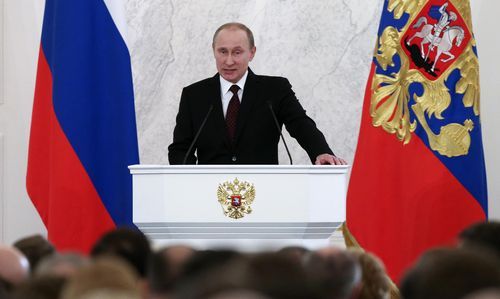Putin’s anniversary monolog
Alexei MAKARKIN: “Publicly, Russia takes great pains to show it is not putting pressure on Ukraine”
As Russian President Vladimir Putin delivered his 10th address to the Federal Assembly, he was quite restrained. BBC reported that in his annual address to parliament, the president spoke about the nation’s achievements as well as (and predominantly) about its challenges, including corruption, low productivity and economic slowdown. Putin touched upon traditional values, too, which, in his opinion, must be relied on in bringing up a new generation of Russians. “We need not just schools that teach students, even though it is extremely important and their greatest task, but also schools that shape individual into a loyal citizen of this country who has absorbed its values, history and traditions, has a broad outlook and high internal culture, is capable of creative and independent thinking,” Putin said at the event held at Georgievsky Hall of the Grand Kremlin Palace. Russian journalist and writer Viktor Shenderovich was quite skeptical about this passage of Putin’s speech. “Our traditional values are Asian police state, brutal Petrine secret services and Count Sergey Uvarov’s dumb triad ‘Orthodoxy, Autocracy, and Nationality.’ The problem is, while Europe has changed, we have stayed true to our priorities over centuries, just rehashing our rhetoric when flags change,” he wrote in his column on Ezhednevny Zhurnal website.
The president, of course, did not fail to cover Ukraine in his address. According to the Kremlin leader, real achievements of Eurasian integration “will only boost interest in it” among Russia’s neighbors, “including our Ukrainian partners.”
Putin mentioned Euromaidan, too. He stated, in particular, his hope that the opposition and the government “will be able to reach an understanding for the greater good of Ukrainian people and resolve the accumulated problems.” Regarding Ukraine’s accession to the Customs Union (CU), Putin spoke in a quite dry and traditional manner: “We do not impose anything on anyone. However, if our friends have a desire to work together, we are ready to continue this work at expert level.” He also reminded that this integration project “is based on equality and real economic interests.”
The Day asked deputy director of the Center for Political Technologies Alexei Makarkin to comment on Putin’s address.
“It contains two main signals. The first is pointing out of the civilizational differences between Russia and the West. That is, Russia had for a long time, at least verbally, emphasized that it belonged to European civilization, and if it sometimes criticized the West, any critique was of a specific nature. It dealt with specific issues related to missile defense or attempts to resuscitate world politics. But now, with an ongoing conservative campaign, anti-Western rhetoric is being shaped as a general drive to reject the entire direction of development chosen by the ‘criminal’ West. It goes beyond political issues, involving also moral and ethical sphere. Russia is positioned as a bastion of traditional family values, while the West is presented as a civilization going into a dead end. Thus, Russia’s ‘traditional’ stances regarding, for instance, missile defense or military threats, keep going and look even firmer in this new context.
“The second signal deals with a domestic political issue, the president’s attitude towards Dmitry Medvedev’s Cabinet. Putin did not criticize it directly. However, according to unwritten rules of the game in Russia, any presidential criticism of the Cabinet is more likely than not to end in its resignation. The president, though, is unwilling to dismiss the Cabinet just now. He said that he had many issues with how his policies in various fields and his 2012 edicts of obviously populist character were implemented. This is another warning bell for the Medvedev Cabinet.”
What should the Ukrainian government and society make of this address?
“Publicly, Russia takes great pains to show it is not putting pressure on Ukraine, that it is the West doing so in its attempts to include Ukraine in the EU’s sphere of interest. I think this stance aims to create a contrast in information space, showing that while the West is intervening, criticizing, visiting Independence Square, Russia is stressing that the decision is up to Ukrainians only. However, Russia, of course, is interested in having Ukraine to not only backtrack on its agreement with the EU, but also accede to the CU soon. It is another matter that Russia is trying to talk about it carefully. Thus, if the West is sending its representatives who are engaging in the most public diplomacy, meeting with various political forces, the Russian president prefers to meet with Yanukovych one on one. There were several such meetings recently.”






